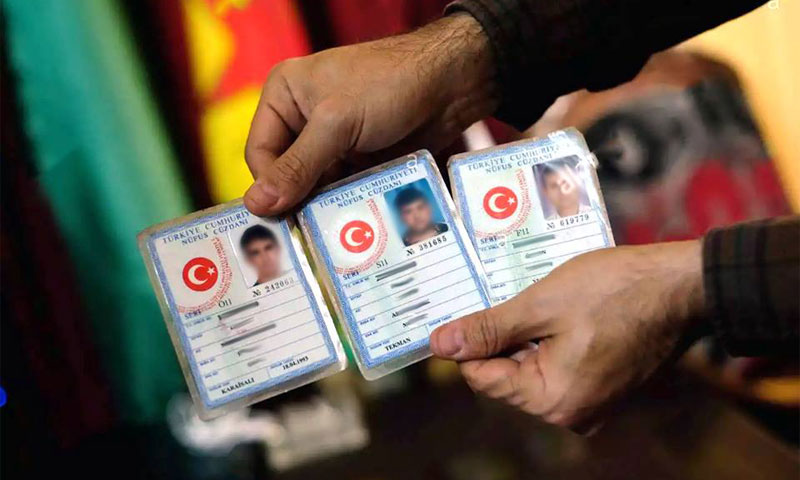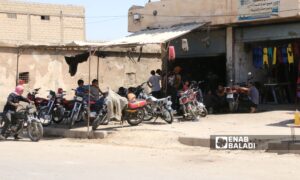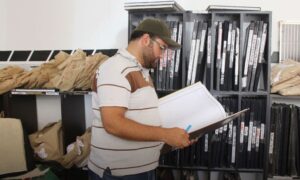
Are They Compelled?
Syrians Change their Names to Obtain the Turkish Nationality

“In an interview on granting the Turkish nationality, the officer asked me to change my nickname because it wasn’t Turkish. I tried to hold on to my opinion as much as possible, but he refused and told me that according to Turkish law it was not possible. So, I had to change it with another Turkish nickname, turning into another Manal”
The case of changing the name of Manal, a 27 years old Syrian resident in Turkey, is seen from two points of view: the first considers it as a reintegration into the new society, whereas others see it as an abandonment of the Syrian identity.
The war forced many to escape in search for a safer home amidst repeated attempts to obtain a second nationality, which is followed by a change of the name or nickname of the person, like what is happening in Turkey.
The search for nationality is attributed to the fact that most of the countries decided to close their borders in the face of Syrian people. Only 30 countries allow Syrians to enter their lands, some of which also impose complicated conditions. This has led to the ranking of the Syrian passport among the world’s four worst passports.
Because of the kinship ties and the number of Syrians that reaches about three millions in Turkey, some have attempted to apply for citizenship according to the law of the country, either on the basis of Turkish origins or other reasons such as a five years residence, and sometimes with an official request from the Directorates of Naturalization and Residence.
Enab Baladi observed cases of changing the name or nickname of those who had obtained or applied for Turkish citizenship. Some of them said that it was “compulsory” but others considered it “optional.”
In order to get the correct answer for the reality of the change of names, Enab Baladi has contacted specialized human rights organizations and obtained a copy of the Turkish citizenship law.
Returning to Manal, who asked not to mention her real name for personal reasons, she assured to Enab Baladi that she had been asked to change her nickname by deleting one of its letters to suit the Turkish pronunciation, after an attempt on the part of the officer to entirely change it.
The same thing happened to several people whom Enab Baladi met. Some of them changed their entire nickname or name, whether a total or partial change, and that involves replacing the Arabic pronunciation with a Turkish one.
Funny Situations or Bearing Bad Meanings
Abd Al- Razzaq Al- Alloush, a Syrian lawyer and a specialist in citizenship and residence in Turkey, confirmed to Enab Baladi that changing the name when applying for Turkish citizenship is “optional” and not “compulsory.”
Al- Alloush said that a person who wishes to obtain the Turkish nationality can retain his name or nickname, or request to change it regardless of his country of origin. He pointed out that the civil law in Turkey is clear and straightforward regarding this matter.
When asked about the cases where people had to change their names at the request of the responsible officer, Al- Alloush clarified the existence of several reasons behind this request, despite the fact that the general Turkish law did not imply it. While the first reason is the possibility of misunderstanding between the officer and the references, the second has to do with the nature of the name itself; that is, it does not conform with the terms of the Turkish language. Except for this, this is contrary to the Turkish law and it is regarded as an individual “moody” act on the part of the officer, or perhaps there may be an exceptional expansion of the basic law.
Alloush, who is fluent in Turkish language, gave the example of the word “network.” The word has several meanings in Arabic: the first is literal, the other is informative and economic, and it may refer also to a group of companies or associations. But, this word has a different negative meaning in the Turkish language, which is “gang.”
In a similar case, if the Arabic name has a meaning that is bad, funny or different to the point that it is not acceptable in Turkish, the person is asked to change his name or nickname.
My Name Is Table
Regarding the meaning of names in Turkish and among the cases, which Enab Baladi encountered, that required the change of name due to its bizarreness is the name “Massa.” It is a kind of jewelry in the Arabic language, but in the Turkish language it has a completely different meaning that is taken from the Spanish language: “table.”
This law includes all foreigners not only Syrians, and the same matter is also applied in the Syrian law.
What are the Legal Effects of the Change of the Name?
Enab Baladi tried to know the repercussions of changing the name regarding the legal side and their effects on official transactions, banking or certificates etc.
If a person is obliged to change his name or nickname, he must prove to the concerned departments, whether in universities, embassies, government departments or banks, that he is still the same person.
In order to prove this, the person shall apply in the Turkish General Directorate of Population and Citizenship Affairs along with a nationality decree issued by the Ministry of Interior so as to get a name modification statement.
If a person is required to show his identity in a foreign country outside Turkey, he / she must get a ratification from the ministry of foreign affairs and the embassy of the country of destination in order to highlight the required documents.
As an example, if a person obtains an engineering certificate from Syria or Turkey and wants to present it to a new authority but the name on the passport or identity is different from the one on the certificate, he must then justify the connection between the two different names.
Briefly, name changing has negative repercussions and the concerned person suffers from subsequent problems, whether in Syria, Turkey or the county he is going to.
As for banking transitions, the person may have to liquidate his old account to avoid subsequent problems, or to present a statement of modification to the concerned banking authority once and to demand the use of one of the two names.
“Regulations concerning the implementation of the Turkish Nationality Law No.5901
Registration of name and nickname.. Article 74
Foreigners applying for Turkish citizenship can change their names or nicknames to Turkish ones.
In case the person wishes to retain his foreign name, he must write it in Turkish letters, according to Law No.1353 which is related to the acceptance of Turkish letters and their applications, and must also record it in the family register.
The first name shall be registered with no more than two words and without abbreviations.
As for the nickname, it takes into account the principles found in the Turkish nickname law, which restrains the nickname to be a single word and stipulates that nothing separates the name and the nickname, such as lines, points or any marker.”
Integration into the New Country
When a person changes his name or nickname, he is unconsciously isolated from his past and history, and perhaps his old friends and relatives. To find out about the social and psychological repercussions, Enab Baladi contacted Amani Sinda, a psychologist who works in a refugee center in Turkey. She considers that the objective of changing names or nicknames is to facilitate the process of integration and fusion into the new society and homeland. Besides, she indicates that this is normal for people who live in this State, accept its citizenship, work and have social relationships in it.
Sinda’s analysis corresponds to the behavior chosen by some Arab residents in Turkey, who changed their names through their social media accounts to the Turkish pronunciation (Ahmet, Mehmet, Ömer) even though they did not initiate the procedures for obtaining the Turkish citizenship yet.
Social Heritage
According to Sinda, when talking about the social effects on the individual, his family or his children in the future, the matter has “serious repercussions.” Actually, the family name in the Syrian society is associated with the family’s heritage which represents a source of pride, especially for well-known and deep-rooted families.
The psychological specialist considered that a person, after giving up his name, starts from scratch and abandons a social, historical and cultural heritage related to his past and family. This can have negative impacts on children in particular. When the child feels the difference between him and the rest of the children and notices that other families have relatives with the same nickname, he / she starts wondering: Why do they have similar nicknames while we have nicknames different from our relatives and grandparents.
This generates a state of psychological instability for the child or person who suffers from anxiety stemming from the previous environment in which he lived and from his former nickname by which he was called.
However, can a change of name or nickname result in a state of alienation from the motherland to the concerned people?
Sinda believes that this cannot be considered as alienation. Today, Syrians are in a state of war and they are insecure in their own country. This in itself is seen as a state of alienation, especially with the presence of people who have quickly integrated into the new communities.
if you think the article contain wrong information or you have additional details Send Correction
النسخة العربية من المقال
-
Follow us :
Most viewed
- Syrians pack their bags in Turkey
- After European call to engage with Syrian regime, Italy appoints ambassador to Damascus
- Syrian pressures prevent Omar al-Aroub from attending Paris Olympics
- Turkey and Russia discuss resuming patrols on M4 highway
- After Baraa Qaterji’s elimination, Is Syrian regime replacing its economic façade?

















 A
A
A
A
A
A








 More Society
More Society